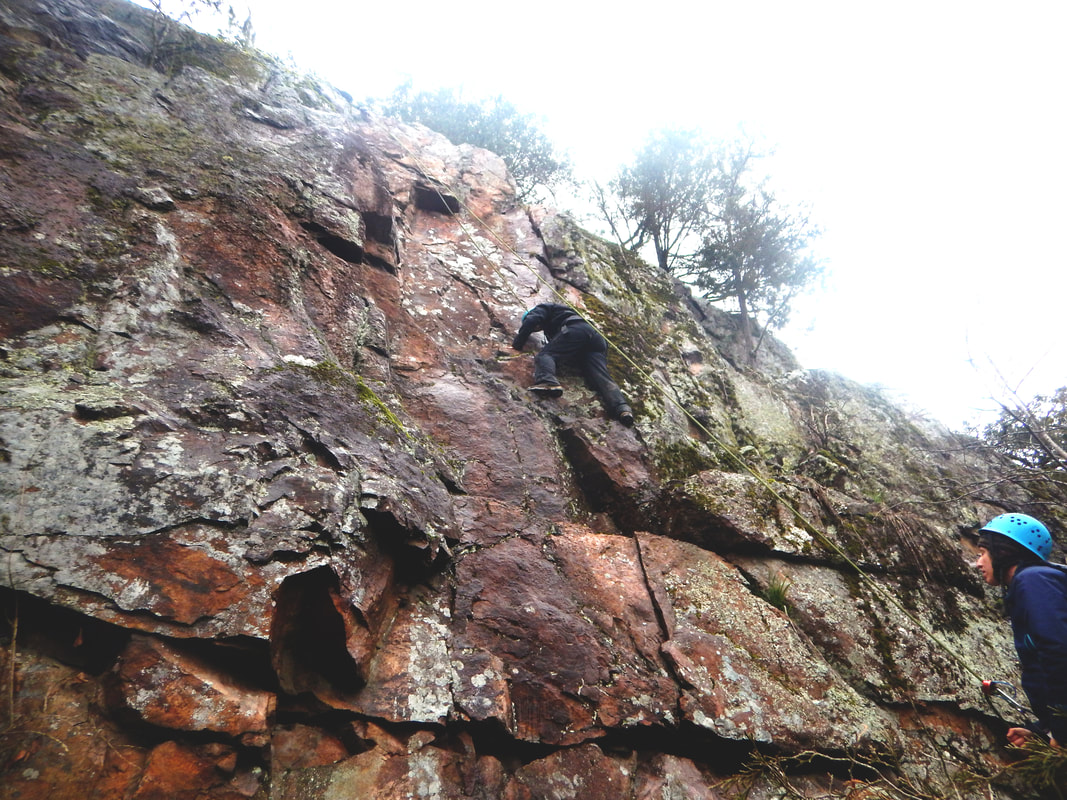by Joel BatesAs the afternoon shadows lengthened and the climbers’ arms and legs grew weary, the youth minister stepped up to the rock. He was only a few years older than the group he led, a little overweight, and particularly nervous about heights. “All my students have done it, so I guess I better try it, too,” he said with some uncertainty. One of our interns, Katie, pledged to keep him on belay, and I vowed to encourage him any way I could. Within moments of leaving the ground, he echoed the same lie that had plagued the others all day, “I can’t.” I’ve heard it uttered by whimpering students, whispered candidly by adult sponsors, and echoed off the surrounding hills by exasperated college students, the all too common phrase, “I can’t!” But the other day at the climb site, it seemed like every other participant had a particularly bad case of this verbal, oath-born malady. They would walk sullenly up to the rock face, tie in to the rope, and before even starting the belay contract, would utter the deadly “I can’t” declaration. They told themselves that the rock was too big, too difficult, and too scary. I had gone along on the outing as an extra, so as I noticed this negative theme unfolding, I positioned myself at the top of our easiest climb. I did this to help those fearful “I-can’ters” to know someone was at the top waiting for them. I hoped it would be a comfort to them. From my perch, I watched Katie dutifully and gracefully urge timid climbers to go just a little bit higher. She patiently stood through the barrage of profuse verbal resistance, waiting until they were willing to try. I collaborated with her through the occasional encouragement and continual prayer from above. I love this particular climbing crag because the most difficult part is in the first eight feet of the ascent. While those first moves are more difficult physically, for most the truly difficult part comes later as they will themselves to climb higher. Though the going is easier higher up, the fear grows, thus every small victory is inviting more perceived peril. As a facilitator who is somewhat afraid of heights, I totally understand this challenge. However, I’ve been richly blessed by the cliffs I’ve climbed, pushing against my fear and moving toward victory. It’s a character developing experience that money can’t buy. Since the hard part is at the bottom, when we facilitators see a participant scramble beyond this section of rock, we can know that they possess the ability to get to the top, at least tangibly. This is helpful in giving us a barometer with which to challenge people appropriately. We can subtly check the physical ability question off the list and move on to the more important matters of the heart where courage, perseverance, temperance, and self-control reside. I was thrilled to see one student after another make it to the pinnacle. I celebrated the victory with a high-five and reminded them of the truth that they really did make it to the top. But when the youth minister started his climb with the same pessimistic mantra, I had to have a little chat with him. “Listen, friend, your students have been saying, ‘I can’t,’ all day. You just said it, too. This is not from the Lord. Your job is to disciple them in the Lord, and part of that means changing the culture. You have to stop teaching them by the words ‘I can’t’ and start teaching them by the words ‘I can.’” He was panting and red-faced as sweat ran down his brow. He nodded in agreement and looked back at the rock with determination. “You are making disciples in the Kingdom of the “I Can,” I added offhandedly. Those last words sent chills up my spine as I thought of many of God’s heroes of the faith, struggling with their callings, facing unstoppable foes, and standing against impossible odds. By their own strength, they did not have what it takes, but with God on their side, they could overcome any obstacle. Hebrews 11 provides a list of ordinary people who followed God into the fray to become extraordinary saints, not because they had what it took, but because they served the God of the Kingdom of the “I Can.” I know God revealed His name to Moses as the Great I Am, but sometimes I feel like God’s middle name should be the Great I Can! Paul said in Philippians 4:13 that he could do all things through Christ. I’ve heard many burgeoning humanists take this verse out of context to promote a theology that we can achieve anything we put our mind to, but this is worldly thinking and obviously foolish. There are some rocks we just cannot climb. Paul listed a bunch of situations that he needed God’s help to get through. Stuff like suffering from floggings and shipwrecks and starvation for the sake of the gospel. Stuff like having plenty and being in comfort all the while keeping these in their rightful place. With Jesus, the King of the “I Can,” we can fulfill the adventurous life He is leading us through. That’s a life bigger than you could think up or even imagine. A favorite example of this wonderful God of the “I Can,” is found in 2 Corinthians 1:18-22: As surely as God is faithful, our word to you has not been Yes and No. For the Son of God, Jesus Christ, whom we proclaimed among you, Silvanus and Timothy and I, was not Yes and No, but in him it is always Yes. For all the promises of God find their Yes in him. That is why it is through him that we utter our Amen to God for his glory. And it is God who establishes us with you in Christ, and has anointed us, and who has also put his seal on us and given us his Spirit in our hearts as a guarantee. (ESV) God’s answer to you today is, “Yes!” Are you forgiven? Yes, you are! Is He with you? Yes, He is! Will He help you with your troubles today? Yes, He will! Is He able to redeem the mistakes you’ve made and set you back on course toward a bright future? Yes, He can! Are you His beloved whom He loves to spend time with enjoying rich fellowship? Yes! Yes! Yes! These are made possible because we are part of the Kingdom of God.
There was a terrible day long ago when the Father said, “Who can redeem all humanity and restore their fortunes bringing them back in fellowship with me? Who can defeat all the enemies of God and humankind with a single act? Who can destroy death itself eradicating the curse of Adam?” The heavens and the earth were silent in response to the Father’s question until one man, King Jesus, climbed Golgotha, hung on the cross, and there, in the balance between sinful men and holy God, he cried out, “I CAN!” As my youth minister friend pulled himself to the top ledge, completing the climb with his last ounces of strength, he had victorious tears in his eyes. “You were right,” he said. “I can!”
1 Comment
|
Come along side us as we journey in and out of the wilderness, discovering our Creator in creation.
Archives
July 2024
Categories |
Contact Us
|
|


 RSS Feed
RSS Feed

